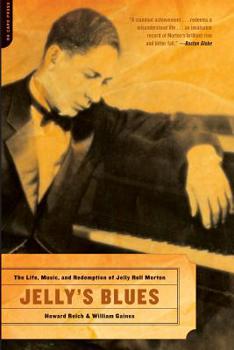Jelly's Blues: The Life, Music, and Redemption of Jelly Roll Morton
Select Format
Select Condition 
Book Overview
Jelly's Blues vividly recounts the tumultuous life of Jelly Roll Morton (1890-1941), born Ferdinand Joseph Lamonthe to a large, extended family in New Orleans. A virtuoso pianist with a larger-than-life personality, he composed such influential early jazz pieces as "Kansas City Stomp" and "New Orleans Blues." But by the late 1930s, Jelly Roll Morton was nearly forgotten as a visionary jazz composer. Instead, he was caricatured as a braggart,...
Customer Reviews
The Greatest Jazz Composer, Mr. Jelly Lord
Chapters Six through Eight Make This Book
A sad tale of genius, robbed by Melrose
Jelly Roll Rests His Case
The Biography That Reads Like a Mystery Story
Jelly's Blues: The Life, Music, and Redemption of Jelly Roll Morton Mentions in Our Blog

Langston Hughes described the experience of the Harlem Renaissance as "…to express our individual dark-skinned selves without fear or shame." It was a movement of the senses, steps quickened to the sound of Jazz and Blues, the air was redolent of food reminiscent of Carolina and the Caribbean, the mind was stimulated by new ideas, and the energy was like an electric current to a wire.





